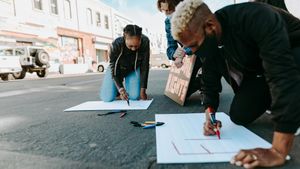Delegates from nearly 200 countries have gathered for the COP29 climate negotiations held from November 11 to November 24, 2024, at the Baku Convention Center in Azerbaijan. The COP29 summit, organized under the United Nations Framework Convention on Climate Change (UNFCCC), aims to address pressing challenges related to climate finance, carbon emissions, and global warming amid growing concerns and uncertainty following the recent re-election of Donald Trump as the President of the United States.
The conference opened with remarks from UN climate chief Simon Stiell, who urged world leaders to demonstrate their commitment to global cooperation, declaring, “Here in Baku, we must agree on a new global climate finance goal.” His comments reflect the urgent need for action, especially since many nations express difficulty affording rapid emissions reductions. The summit's agenda is particularly focused on determining how funding for climate actions targeting poorer nations will be structured and scaled beyond the existing $100 billion per year commitment.
Speaking at the opening ceremony, Azerbaijan's Ecology Minister and COP29 president, Mukhtar Babayev, emphasized, “Climate change is already here.” He called COP29 “the unmissable moment to chart a new path forward for everyone.” This year’s discussions come against the backdrop of alarming predictions of record-breaking temperatures in 2024, amplifying calls for increased funding for climate-resilient infrastructure and interventions for vulnerable communities.
Stiell, addressing the growing urgency of climate action, stated, “If at least two-thirds of the world’s nations cannot afford to cut emissions quickly, then every nation pays a brutal price.” His remarks resonate with the sentiment shared by many at the summit, particularly developing nations seeking to amplify their financial aid.
Despite the fervent calls for cooperation, the conference has been clouded by notable absences. Leaders from the world’s most significant emitters—such as President Biden, Chinese President Xi Jinping, Indian Prime Minister Narendra Modi, and French President Emmanuel Macron—are conspicuously missing, leaving many observers wondering about the potential impact this could have on global climate negotiations. The absence of these leaders raises concerns about the commitment of major economies to tackle climate issues effectively.
Trump’s re-election looms large over the talks, with potential rollback of the U.S. commitments to the Paris Agreement resulting from his administration’s previous policies. Ralph Regenvanu, Vanuatu’s special envoy for climate change, cautioned, “We cannot afford to let the momentum for global action on climate change be derailed.”
A strategic shift is anticipated as many developing countries push for increased commitments beyond the existing climate financing frameworks. Damilola Ogunbiyi, UN Special Representative on Sustainable Energy, pointed out the disparity highlighting, “Only 15 percent of record-breaking investments in clean renewable energy goes to the global south.” This indicates the pressing necessity for transforming climate finance from what is often perceived as charity to collaboration and investment.
The negotiations at COP29 are expected to be particularly complex, as they tackle divisions on climate funding models and payment responsibilities. Adonia Ayebare, chair of the climate finance bloc comprising over 100 developing countries, articulated the situation succinctly: “It’s hard. It involves money. When it’s money, everybody shows their true colours.”
Early discussions have signaled the potential for raising the target from the current annual $100 billion to substantial figures required to achieve the climate goals set out within the Paris Agreement. With the fate of those negotiations uncertain, the psychological atmosphere surrounding COP29 reflects both urgency and skepticism.
The summit also brings together representatives from Afghanistan, attending for the first time since the Taliban takeover, which points to shifts and changes within global diplomatic frameworks. Meanwhile, developing countries are hopeful for constructive outcomes as they prioritize survival strategies amid climate-induced hardships.
On the technical side, several breakthroughs have been noted with the approval of new UN standards for global carbon markets, allowing countries to exchange carbon credits—a product of emissions-reducing projects—among one another. This development, seen as significant, marks progress following complicated negotiations spanning nearly ten years. Carbon credits are produced by efforts like tree planting or substituting fossil fuels with renewable energy sources and are intended to incentivize and support countries working to limit their greenhouse gas emissions.
Erika Lennon of the Center for International Environmental Law commented on the significance of this movement, noting it could lead to more structured exchanges of emissions credits globally, which may help integrate market mechanisms for climate action.
Nonetheless, challenges remain, as there are still concerns about governance, equity, and whether the carbon market will genuinely incentivize substantial emissions reductions or permit large corporations to continue carbon offsets without significant action on their emissions.
This year's COP talks promise deliberations laden with weighty issues impacting both the present and future of climate action. With over 50,000 individuals expected to participate, many will be observing closely to witness whether COP29 can emerge as more than just another talk shop and instead deliver concrete results toward overcoming the climate crisis.
Following deals on carbon markets, officials will focus on securing commitments related to funding for vulnerable nations, which is intricately tied to the potential outcomes of COP29. All eyes are on whether the conference can navigate through the political hurdles and reach agreements significant enough to shift the course of climate action toward tangible impact.
Despite the absence of major world leaders, the summit remains pivotal as nations, particularly those most at risk, seek to assert the need for climate finance, stability, and equitable participation within global climate agreements. COP29 serves as both a backdrop for dialogue and as the rallying point for collective action, urging all nations to confront climate change together, not only for survival but for equity and future generations.



